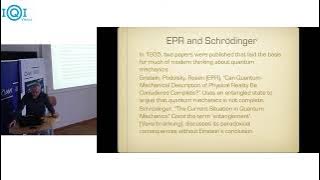The Prehistory of Entanglement: Schrödinger and the Development of the Einstein-Podolsky-Rosen Paradox

Einstein, Podolsky, and Rosen had exploited this formal property to argue that quantum mechanics is incomplete in its description of reality. Schrödinger rejected their conclusion, but he was the only one among the founding generation of quantum physicists to agree that they had pointed to a fundamental problem in the interpretation of quantum physics.
There has been little known about the genesis of these two papers, even though especially the development of Einstein’s thought has given rise to a lot of speculations. We have found in Schrödinger’s research notes a rich and hitherto unused source about their prehistory. They show that Schrödinger’s publication of 1935 was the result of many years of reflection of the phenomenon of entanglement that he had been long aware of: Already in 1926 he struggled with it as a problem for a physical interpretation of wave mechanics. The notes also document the discussion in 1931 that gave Einstein the original idea for the EPR thought experiment and Schrödinger’s struggle to make sense of it.
[with Jos Uffink, Utrecht]

